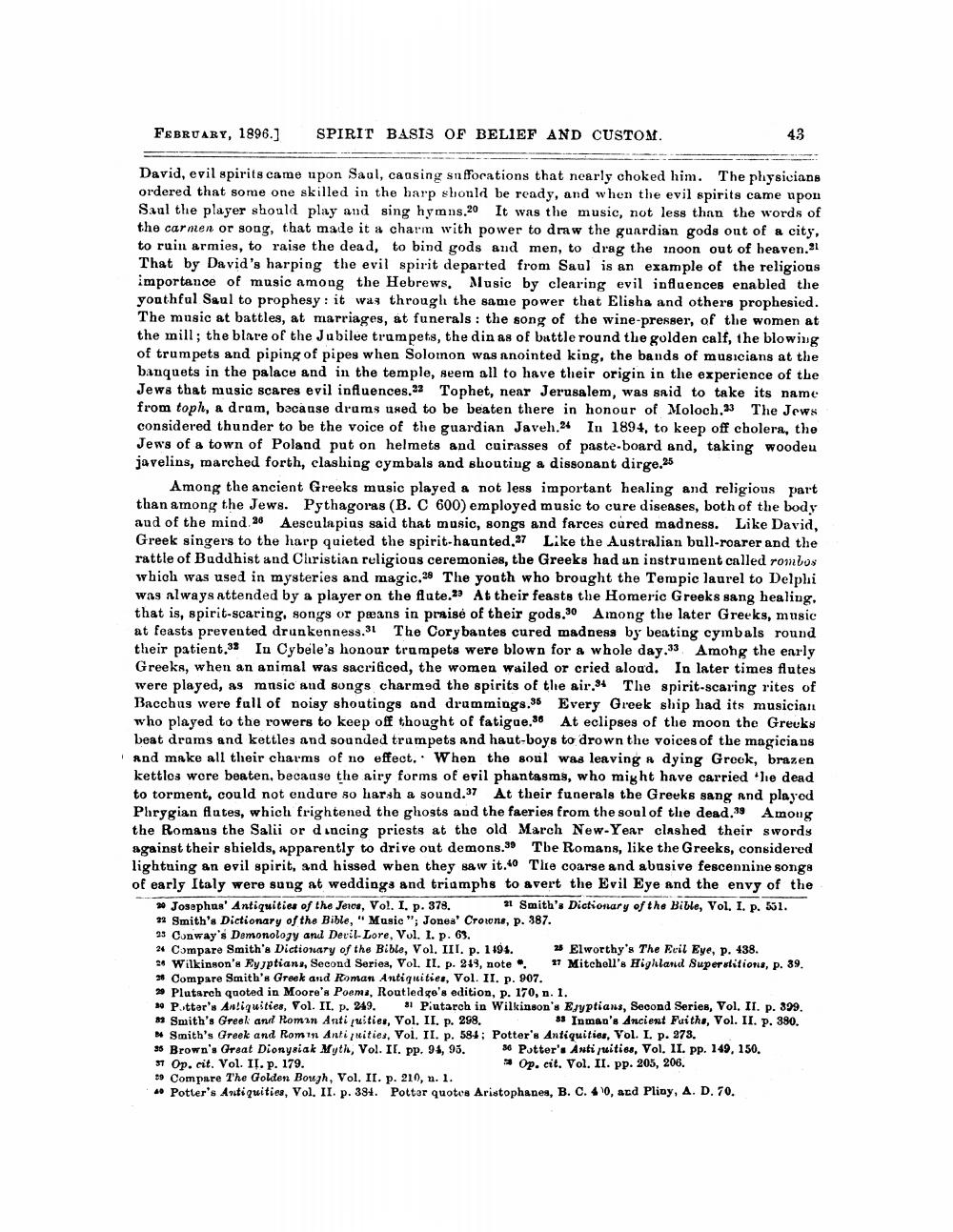________________
FEBRUARY, 1896.]
SPIRIT BASIS OF BELIEF AND CUSTOM.
43
David, evil spirits came upon Saul, causing suffocations that nearly choked him. The physicians ordered that some one skilled in the harp shonld be ready, and when the evil spirits came upon Saul the player should play and sing hymns.20 It was the music, not less than the words of the carmen or song, that made it a charm with power to draw the gunrdian gods out of a city, to ruin armies, to raise the dead, to bind gods and men, to drag the inoon out of heaven. That by David's harping the evil spirit departed from Saul is an example of the religious importance of music among the Hebrews, Music by clearing evil influences enabled the youthful Saul to prophesy: it was through the same power that Elisha and others prophesied. The music at battles, at marriages, at funerals: the song of the wine-presser, of the women at the mill; the blare of the Jubilee trumpets, the din as of battle round the golden calf, the blowing of trumpets and piping of pipes when Solomon was anointed king, the bands of musicians at the banquets in the palace and in the temple, seem all to have their origin in the experience of the Jews that music scares evil influences.32 Tophet, near Jerusalem, was said to take its name from toph, a dram, because drams used to be beaten there in honour of Moloch.33 The Jews considered thunder to be the voice of the guardian Javeh.24 In 1894, to keep off cholera, the Jews of a town of Poland put on helmets and cuirasses of paste-board and, taking woodeu ja velins, marched forth, clashing cymbals and shouting a dissonant dirge.25
Among the ancient Greeks music played a not less important healing and religious part than among the Jews. Pythagoras (B. C 600) employed music to cure diseases, both of the body and of the mind 26 Aesculapias said that music, songs and farces cured madness. Like David, Greek singers to the harp quieted the spirit-haunted,37 Like the Australian bull-roarer and the rattle of Buddhist and Christian religious ceremonies, the Greeks had un instrument called rombos which was used in mysteries and magic, 28 The youth who brought the Tempic laurel to Delphi was always attended by a player on the flute. At their feasts the Homeric Greeks gang healing. that is, spirit-scaring, songs or peans in praise of their gods.30 Among the later Greeks, music at feasts prevented drunkenness.31 The Cory bantes cured madness by beating cymbals round their patient.33 In Cybele's honour trampets were blown for a whole day.33 Among the early Greeks, when an animal was sacrificed, the women wailed or cried aloud. In later times flutes were played, as music and songs charmed the spirits of the air.34 The spirit-scaring rites of Bacchus were fall of noisy shoutings and drummings.35 Every Greek ship had its musician who played to the rowers to keep off thought of fatigue.36 At eclipses of the moon the Greuks beat drams and kettles and sounded trampets and haut-boys to drown the voices of the magicians and make all their charms of no effect. When the soul was leaving a dying Greek, brazen kettlos were beaten, because the airy forms of evil phantasms, who might have carried 'he dead to torment, could not endure so harsh a sound.37 At their funerals the Greeks sang and played Phrygian flutes, which frightened the ghosts and the faeries from the soul of the dead.39 Among the Romans the Salii or dancing priests at the old March New-Year clashed their swords against their shields, apparently to drive out demons.3 The Romans, like the Greeks, considered lightning an evil spirit, and hissed wben they saw it. The coarge and abusive fescennine songs of early Italy were sung at weddings and triamphs to evert the Evil Eye and the envy of the
0 Josephus' Antiquities of the Jeroe, Vol. 1. p. 373. Smith's Dictionary of the Bible, Vol. I. p. 551.
Smith's Dictionary of the Bible, "Music"; Jones' Crowns, p. 387. 93 Conway's Demonology and Devil Lore, Vol. I. p. 63. 24 Compare Smith's Dictionary of the Bible, Vol. III. p. 1194. Elworthy's The Evil Eye, p. 438. 24 Wilkinson's Eygptian, Second Series, Vol. II. p. 213, note 17 Mitchell's Highland Superstitions, p. 39. » Compare Smith's Greek and Roman Antiquities, Vol. II. p. 907. >> Plutarch quoted in Moore's Poems, Routledge's edition, p. 170, n. 1. 10 Potter's Antiquities, Vol. II. p. 249. Plutarch in Wilkinson's Egyptians, Second Series, Vol. II. p. 399. M Smith's Greek and Roman Antiquities, Vol. II. p. 298.
Inman's Ancient Faithe, Vol. II. p. 380. M Smith's Greek and Roman Antiquities, Vol. II. p. 584; Potter's Antiquities, Vol. I. p. 278. 38 Brown's Great Dionysiak Myth, Vol. II. pp. 94, 95. Putter's Antilities, Vol. II. pp. 149, 150. 37 Op. cit. Vol. II. p. 179.
= Op. cit. Vol. II. pp. 205, 206. 39 Compare The Golden Bough, Vol. II. p. 210, n. 1. • Potter's Antiquities, Vol. II. p. 384. Potter quotes Aristophanes, B. C. 40, aud Pliny, A. D. 70.




